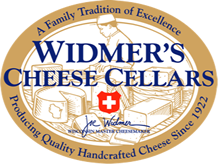Widmer’s Cheese
Cellars Legacy
Carrying on Widmer’s traditional Brick production – to the tune of 360,000 pounds a year. Joe still uses the same open vats in the 12,000 square-foot facility that his grandfather bought in 1922.
In Wisconsin, the cheese making legacy runs deep and examples of third-and fourth generation Wisconsin cheese makers carrying on the family tradition are common. Joe Widmer, of Widmer’s Cheese Cellars in tiny Theresa, Wisconsin, is one such third-generation example. Born into the craft and raised with his six siblings in quarters above the cheese plant, Widmer has succeeded in building the business with a combination of strict adherence to tradition and savvy marketing.
Widmer’s best known for producing Brick cheese and traditional stirred-curd Colby, both Wisconsin original created in small towns nearby. More recently, Widmer has gained fame for his four-year cheddar, a 2002 ACS winner and, according to Joe, a specialty that’s fast become a signature product, changing demographics, in a part, are credited with the tipping of the scales in term of sales and production from brick to cheddar.
“Most people today don’t know what real Brick is.”
“When my grandfather, John Widmer, immigrated to Wisconsin from Switzerland In 1905, the local population was heavily German. The market for a cheese such as surface-ripened Brick was strong, and logistics weren’t an issue. He simply sold what he made right here. Today, demographics and taste have changed and the market for traditional Brick isn’t as strong as it once was. We sell much more mild brick then the authentic surface-ripened variety, and cheddar and colby are very strong. Most people today don’t know what real Brick is.”
That said, Joe carries on Widmer’s traditional Brick production-to the tune of 360,000 pounds a year. He still uses the same open vats in the 12,000 square-foot facility that his grandfather bought in 1922. And he still uses the same well-worn bricks that his grandfather used to press the whey from the cheese in the forms. In fact, he’s credited as being the only cheesemaker in the country to continue to use real bricks as part of the make procedure.
Like bars of white gold in a vault, Widmer’s Brick cheeses line wooden curing room shelves from floor to ceiling, each receiving daily hand-washing with B-linen inoculated whey until they reach pungent perfection. At that point, they’re wrapped first in parchment paper and then in foil so they can continue to ripen properly. “Real Brick should have a heady aroma, and the flavor intensifies greatly as it ages,” Widmer says. “It’s not for the timid, but cheese aficionados swoon over it.” The adherence to tradition that Widmer insists on for his Brick cheese carries over to the other varieties he produces, as well. No shortcuts are taken, and all is hand done. Thanks to “grandfather clauses” that enable him to continue using his bricks, his open vats and his wooden curing racks, he’s able to do things the way his family has always done them to produce great cheese.
He has strayed from traditional family methods, however, in the areas of marketing and distribution. When he assumed the company’s reigns in 1992, he says, all of the labels were different and there was no “Widmer’s look.” “I had a logo designed and tried to create a more upscale, unified look for our products,” he said. “These are high-quality, hand-crafted products, but our labels didn’t say that, and neither did our prices. I raised prices to where they should be given the expertise and labor that goes into making our cheese.”
The immediate impact? Sales declined, Widmer admits, but profitability increased. And he’d made these changes at the right time. “Supermarkets were beginning to realize that consumers wanted more upscale, specialty cheeses and that this was a growing market with strong potential,” he says. “Sales did fall off in some of our old accounts, but we began to look at newer, more upscale targets both in food service and at retail. To survive and grow you have to remember that it’s not how much cheese you make that counts, it’s the percentage of profit on the pound.”
The Company Today
Today, Widmer’s cheeses are sold from coast to coast. The company has 22 employees – some who’ve worked there since Joe was in grade school. Over the past few years, Joe has earned certification as a Wisconsin Master Cheesemaker for Brick, Colby and Cheddar, part of his commitment to keep improving his skills and expertise.
Widmer’s product line has expanded to include many flavored variations on Colby and Cheddar, as well as convenience products such as shingle-pack Brick and natural Aged Brick Cheese Spread. While Widmer is considering additional product development, he faces some tough decisions and physical limitations on growth.
“Our growth is limited largely by our facility. We’ve been able to grandfather in a lot of things—like our bricks, our open vats, our brine tanks—because of its age. I have the space to expand, but if I do I’d have to do things differently and I’m concerned that would affect the flavor of the cheese. I don’t know how long I’ll be able to find people to do this kind of labor, or if my kids, who until just a few years ago were also raised above the plant, will get involved. So for now, we’ll keep doing things this way and grow as we can.”
